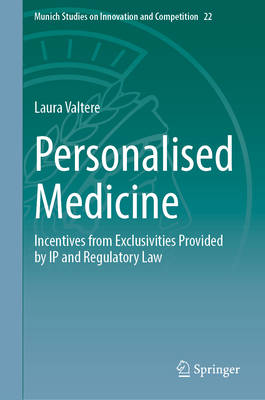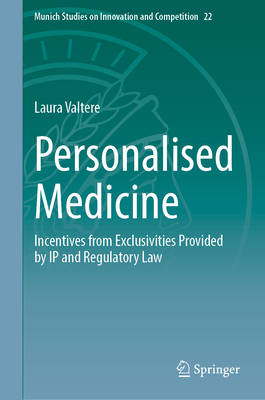
- Retrait gratuit dans votre magasin Club
- 7.000.000 titres dans notre catalogue
- Payer en toute sécurité
- Toujours un magasin près de chez vous
- Retrait gratuit dans votre magasin Club
- 7.000.0000 titres dans notre catalogue
- Payer en toute sécurité
- Toujours un magasin près de chez vous
274,95 €
+ 549 points
Description
"It is commonly held that the limited market of Personalised Medicine (PM) undermines the relevance of patent protection, given the limited returns on investment. However, contrary to initial assumptions, this study finds that PM markets are not per se unattractive financially because of their size. While each application market may be characterised by a smaller consumer base, this does not represent the entire scale of the market. The same substance may be utilised for a multitude of applications, encompassing both personalised and conventional drugs. In addition, factors such as the added value of more efficient and targeted treatments and cost reduction of clinical trials also enhance PM's appeal. Despite the absence of any substantial challenges to the patentability of PM drugs and diagnostics in Europe, the enforcement of these rights against infringement is notably challenging. The uncertain enforcement environment has been shown to encourage strategic behavior from both patent holders and generic manufacturers, potentially leading to market dysfunction. In light of the patent system's inherent limitations, the study also investigates the regulatory exclusivity framework. This study provides an unprecedented holistic examination of the incentives for PM under patent, supplementary protection certificates, and regulatory laws. The study's findings also reveal that while the EU aspires to lead globally in PM research and acknowledge its societal importance--especially given ageing populations and mounting healthcare expenses--no specific exclusivity rights for PM have been introduced or the existing ones adapted. In order to address this gap, the author deconstructs the concept of PM from scientific, economic, and normative perspectives to identify potential subjects that could be covered by exclusivity rights. The in-depth analysis effectively demystifies the complex scientific and economic foundations of PM, rendering them accessible and comprehensible. By undertaking this analysis, the author identifies areas within PM that may benefit from the de lege lata exclusivities or from the implementation of dedicated exclusivity rights as well as the incoherences in de lege lata and its application, especially in regard to regulatory law."
Spécifications
Parties prenantes
- Auteur(s) :
- Editeur:
Contenu
- Nombre de pages :
- 439
- Langue:
- Anglais
- Collection :
- Tome:
- n° 22
Caractéristiques
- EAN:
- 9783032040596
- Date de parution :
- 01-11-25
- Format:
- Livre relié
- Format numérique:
- Genaaid
- Dimensions :
- 155 mm x 235 mm

Les avis
Nous publions uniquement les avis qui respectent les conditions requises. Consultez nos conditions pour les avis.






